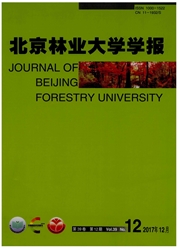

 中文摘要:
中文摘要:
欧美杨是中纬度地区最适合的短轮伐期工业用材集约经营树种之一,然而盐渍、干旱和低温严重影响了欧美杨的生长发育和产量。本文利用RT-PCR等技术克隆出欧美杨PP2C基因并进行了序列分析。Pd PP2C基因开放阅读框为1 320 bp,编码439个氨基酸。蛋白质序列分析表明,PP2C蛋白N端保守性不强,C端有保守的蛋白磷酸酶区域。荧光定量PCR分析表明,该基因在欧美杨根、成熟叶、顶端叶和茎中都有表达且根中表达量最高。逆境胁迫分析表明,该基因受Na Cl、ABA和干旱等诱导表达。干旱和盐胁迫处理下转Pd PP2C基因拟南芥与野生型相比生长受到较少抑制,且叶绿素含量上升,丙二醛含量下降,表明Pd PP2C基因作为一种蛋白磷酸酶提高了拟南芥的抗逆性。
 英文摘要:
英文摘要:
The cottonwood poplar, Populus deltoids, is one of the intensively cultivated species and most suitable for short-term logging in the mid-latituderegion. However, salinity, drought and low temperature seriously affected the growth and yield of this species. In this study, we isolated a PP2C clone from P. deltoids by RT-PCR, and analyzed its sequences. The open reading frame of PdPP2C is 1320 bp, coding 439 amino acids. Sequence analysis of protein indicated that the N end of PP2C protein was not highly conservative, but there was conservative protein phosphatase area in the C end. Realtime-PCR analysis revealed that this gene had been expressed in root, mature leaves, top leaves and stem, with the highest expression in the root. Adversity stress analysis showed that this gene can be expressed by inducing with NaCl, ABA and drought. Additionally, compared with the wild type, the growth of transgenic PdPP2C Arabiopsis was less inhibited by salt and drought stresses, the chlorophyll content increased, and the malondialdehyde content decreased. The above results indicate that PdPP2C as a protein phosphatase increased the resistance of Arabidopsis to various stresses.
 同期刊论文项目
同期刊论文项目
 同项目期刊论文
同项目期刊论文
 期刊信息
期刊信息
